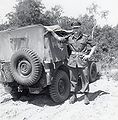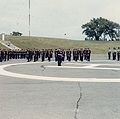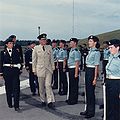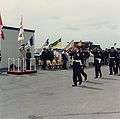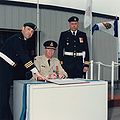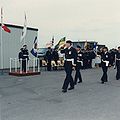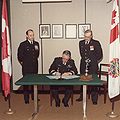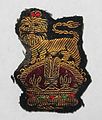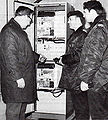Dicker, John Allan
| John Allan Dicker | |
|---|---|
| Born 17 December, 1941 | |
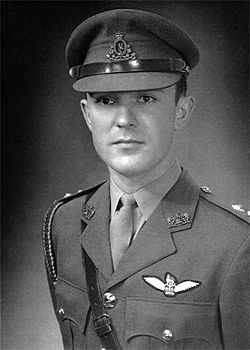 | |
| Place of birth | North Bay, Ontario |
| Allegiance | Canada |
| Service/branch | Canadian Army |
| Rank | Lieutenant-Colonel |
| Awards | CD |
Early Years
John Allan Dicker was born in North Bay Ontario in Dec 1941 where he grew up and received his Secondary School education. While in school, he served five years in Air Cadets.
Service
John was a member of the 8th Field Squadron RCE (Militia) Band until enrolling in the Canadian Army (Regular) in September 1960 in the Officer Candidate Programme (OCP) as a proud member of The Royal Canadian Corps of Signals (RCCS).
He received training at The Royal Canadian School of Signals (RCS of S) in Kingston prior to being posted to 2 Signal Squadron at Camp Petawawa. During this time, having previously expressed an interest in undertaking Canadian Army Pilot training to his OC Major Fred T Harris (a qualified Army Pilot himself) while at RCS of S, he was selected for flight training. He completed primary flying training at RCAF Station Centralia in Dec 1962 and light aircraft (L-19) and helicopter (CH-112) training at CJATC, Rivers Camp, MB in early 1963 culminating in the award of the coveted Canadian Army Flying Badge. He spent four consecutive years at Rivers (April 62 - April 66) during which time, in addition to his flying training courses and continuation flying, he commanded the Air Support Signal Troop and qualified as a Parachutist.
In 1966 John proceeded on an eight month tour of duty with the UN in Cyprus. While there he managed to fly several Aerial Delivery Service (ADS) sorties in the Auster Mk IX aircraft due to the generosity of the pilots of the British Army Air Corps (AAC). Upon his return, he continued his flying, on a continuation basis, with the Kingston Flying Club while serving on Staff at The Royal Canadian School of Signals as a Troop Officer and Instructor. Following this posting he was sent to RCAF Station Portage la Prairie MB where he undertook the Multi-engine Conversion and Instrument Rating Course on the C-45 Expeditor aircraft. After leaving Portage, he assumed the duties of a Line Pilot with 412 (T) Squadron CFB Uplands where he flew Cessna 182 aircraft as a member of the Squadron Cessna Flight.
After a relatively short time on Squadron flying the 182s and after considerable soul-searching, he came to the conclusion that a full-time flying career as a military pilot was neither his desire nor destiny. As a result, and notwithstanding the vagaries of Unification, in December 1968 he made the decision to voluntarily cease flying and requested that he be returned to his former Corps which by now had become the Communications and Electronics Branch of the Canadian Armed Forces. Authority was granted thereby ending his military flying career as a pilot.
412(T) Squadron was followed by a posting to Canadian Forces Communication System (CFCS) (soon to become Canadian Forces Communication Command (CFCC)) HQ in Ottawa as a Staff Officer until 1971 and then to HQ CENTAG Germany as an HF Radio Officer. He was promoted Major in 1972 and returned to Canada to command 3 Signal Squadron in Gagetown NB. During his three years in Gagetown he made a side trip to Egypt where he commanded 73 Canadian Signal Squadron for six months. Canadian Forces Command and Staff College Toronto followed Gagetown in 1975 and thereafter, he was posted to CFS Inuvik as CO from 1976-78. From CFS Inuvik he proceeded to CDLS (London) England where he spent the next three years as a Staff/Liaison Officer. On return to Canada he underwent French language training for one year after which he was promoted to LCol in 1982. Promotion was followed by a succession of staff and command appointments in the Ottawa area, including command of 76 Communication Group for three and one half years and three years in CFCC HQ as Deputy Chief of Staff Support. In 1989 he was posted to Kingston to the Royal Military College as Director of Administration for a period of three years.
John retired from the Regular Force in Septempber 1993 and eventually the Supplementary Reserve Force. He had commanded at all officer rank levels except Captain up to and including Lieutenant-Colonel and served in the Canadian Military (all components being taken into account) for one year shy of 50 years.
Retirement years
John retired to Orleans Ontario where he has maintained his military affiliation by serving as Coordinator on the Editorial Board of the Canadian Army Aviation Website, canadianarmyaviation.ca.
Related Pages
- 3 Signal Squadron
- 73 Canadian Signal Squadron
- 73 Canadian Signal Squadron (CE Newsletter Article)
- 76 Communication Group Headquarters
- Petersville rebroadcast facility
Related Items
References
.
